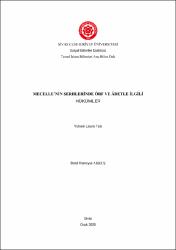Mecelle'nin Şerhlerinde Örf ve Âdetle İlgili Hükümler
Özet
Custom has an important place in all kind of law systems. From the first periods of time, custom with revelation has an important role to maintain human relationship. There has been a different range of connection consistently between these two concepts; custom and revelation.
Şâri' referred lots of issues' detailed judgements to the custom which is a social reality. Therefore Islamic Lawyers took the custom in consideration but they conflicted with the point of which kind of a credential it has. According to the cumulative (common sense of experts in the area), it can be behaved with the custom's rules if it has an evident based on Islamic Law.
The description of the custom took a place in the works of Methods of Islamic Law (usûl-ü fıkıh) in a late period of time- about 8th century. However from at the very beginning of the first periods applying the custom in the Islamic Law in Practice (fürû-u fıkh) shows that the custom is a crucial resource for the Islamic Law.
Describing the place of the custom is important for the legal experts to know the limits of the area given them. Because the legal experts apply to the custom to evaluate, interpret and update the judgments of the custom in the classical texts.
This work of us aims to analyze the custom and the tradition are kind of evidences at the framework of Mecelle's general principles. In the part of introduction, it has given the meaning of principle and its synonyms in addition to the process of preparing Mecelle.
In the first chapter those subjects have been explained: being evidences of the custom and the tradition in the Islamic Law, explanation of the words the custom and the tradition, being the evidence in the Islamic Law, the conditions and kinds of being valid with supporting of their headings.
In the second chapter, the 36th – 45th articles of Mecelle's general principles has been translated to our current Turkish usage from three different paraphrases and in the conclusion chapter, they have been compared and evaluated. Örf bütün hukuk sistemlerinde mühim bir yere sahiptir. İlk çağlardan itibaren insanlar arası ilişkilerin sürdürülmesinde vahiy ile birlikte örf önemli görevler üstlenmiştir. Tarihi süreçte bu iki kavram arasında farklı seviyelerde devamlı irtibat olmuştur.
Şâri', sosyal bir gerçeklik olan örfe itibar etmiş, pek çok konunun detay hükmünü ona havale etmiştir. Dolayısıyla İslam hukukçuları, örfü dikkate almış fakat örfün ne tür bir delil olduğu noktasında ihtilaf etmişlerdir. Cumhura göre, örfle ancak şer'î bir delile dayanması durumunda amel edilebilir.
Örfün tanımı usûl-ü fıkıh eserlerinde 8. yüzyıl gibi geç bir dönemde yer almıştır. Ancak ilk dönemlerden itibaren fürû-u fıkıhta uygulanıyor olması örfün İslam hukuku için önemli bir kaynak olduğunun göstergesidir.
Örfün hukuki konumunun belirlenmesi, hukukçuya tanınan alanın sınırlarının bilinmesi bakımından önemlidir. Çünkü hukukçu, klasik metinlerde yer alan örfî hükümleri değerlendirme, yorumlama ve güncelleme hususunda örfe müracaat edecektir.
Çalışmamız, İslam hukukunda örf ve âdetin delil oluşunu Mecelle'nin küllî kâideleri çerçevesinde incelemeyi hedeflemektedir. Giriş kısmında Mecelle'nin hazırlanış süreciyle birlikte kâide kelimesi ve eş anlamlılarına yer verilmiştir.
Birinci bölümde, İslam hukukunda örf ve âdet, örf ve âdet kelimelerinin tanımı, örf âdetin İslam hukukunda delil oluşu, muteberliğinin şartları ve çeşitleri başlıklarıyla desteklenerek açıklanmıştır.
İkinci bölümde ise, Mecelle'de yer alan küllî kâidelerin 36- 45. maddeleri üç farklı şerhten günümüz Türkçesine aktarılmış, sonuç kısmında kıyaslanarak değerlendirme yapılmıştır.















